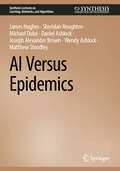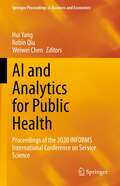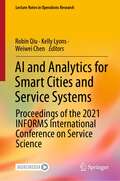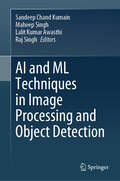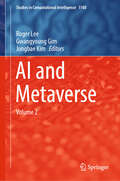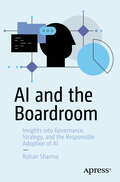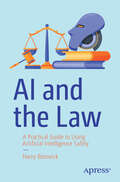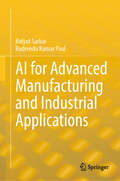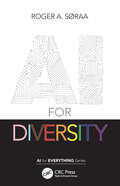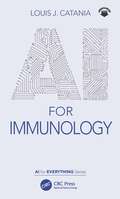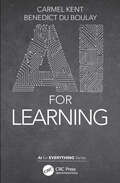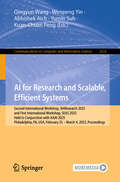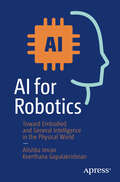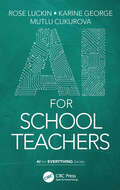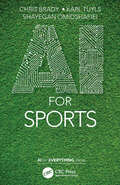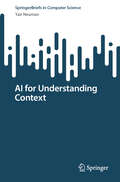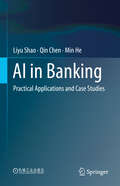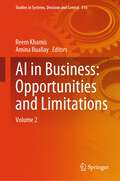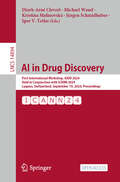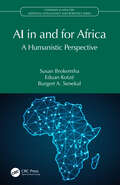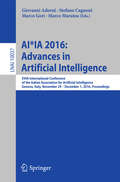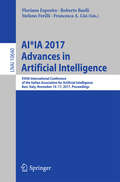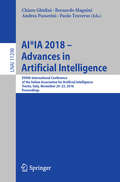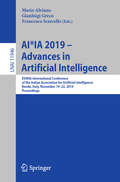- Table View
- List View
AI Versus Epidemics (Synthesis Lectures on Learning, Networks, and Algorithms)
by James Hughes Daniel Ashlock Joseph Alexander Brown Sheridan Houghten Michael Dubé Wendy Ashlock Matthew StoodleyThis book presents algorithms and tools that are designed to model and extract information from personal contact networks, which represent which individuals in a population are physically in contact with one another. The authors developed these tools based on research they conducted during the COVID-19 pandemic, with the goal of improving responses to epidemics in the future. The book provides methods for modelling the transmission of infection across a population. The authors explain how an epidemic model can be used to strategically distribute vaccines and minimize the spread of a virus. The book shows how evolutionary computation, graph compression, and network induction can be utilized to manage issues that arise from an epidemic.
AI and Analytics for Public Health: Proceedings of the 2020 INFORMS International Conference on Service Science (Springer Proceedings in Business and Economics)
by Hui Yang Weiwei Chen Robin QiuThis volume offers the state-of-the-art research and developments in service science and related research, education and practice areas. It showcases emerging technology and applications in fields including healthcare, energy, finance, information technology, transportation, sports, logistics, and public services. Regardless of size and service, a service organization is a service system. Because of the socio-technical nature of a service system, a systems approach must be adopted to design, develop, and deliver services, aimed at meeting end users’ both utilitarian and socio-psychological needs. Effective understanding of service and service systems often requires combining multiple methods to consider how interactions of people, technology, organizations, and information create value under various conditions. Chapters highlight ways to approach such technical challenges in service science and are based on submissions from the 2020 INFORMS International Conference on Service Science.
AI and Analytics for Smart Cities and Service Systems: Proceedings of the 2021 INFORMS International Conference on Service Science (Lecture Notes in Operations Research)
by Weiwei Chen Kelly Lyons Robin QiuThis book showcases state-of-the-art advances in service science and related fields of research, education, and practice. It presents emerging technologies and applications in contexts ranging from healthcare, energy, finance, and information technology to transportation, sports, logistics, and public services. Regardless of its size and service, every service organization is a service system. Due to the socio-technical nature of service systems, a systems approach must be adopted in order to design, develop and deliver services aimed at meeting end users’ utilitarian and socio-psychological needs alike. Understanding services and service systems often requires combining multiple methods to consider how interactions between people, technologies, organizations and information create value under various conditions. The papers in this volume highlight a host of ways to approach these challenges in service science and are based on submissions to the 2021 INFORMS Conference on Service Science.
AI and ML Techniques in Image Processing and Object Detection
by Lalit Kumar Awasthi Maheep Singh Raj Singh Sandeep Chand KumainThis book highlights the evolution and interdisciplinary approach of AI and ML in image processing, tracing historical development and exploring their convergence with different fields. It delves into optimizing neural architectures and making deep learning models interpretable while exploring recent trends like versatile CNN applications and edge computing deployment. The intersection of AI and creativity, dynamic transfer learning, and domain adaptation are discussed alongside object detection techniques and reinforcement learning. It examines advanced applications in satellite imagery, healthcare, and smart cities, addressing ethical considerations like bias mitigation and transparency. This book also outlines future trends such as quantum-inspired computing and the evolution of edge AI ecosystems.
AI and Metaverse: Volume 2 (Studies in Computational Intelligence #1160)
by Roger Lee Jongbae Kim Gwangyoung GimThe book reports the state-of-the-art results in Artificial Intelligence and Metaverse in both printed and electronic form. Studies in Computation Intelligence (SCI) has grown into the most comprehensive computational intelligence research forum available in the world. This book publishes original papers on both theory and practice that address foundations, state-of-the-art problems and solutions, and crucial challenges.
AI and the Boardroom: Insights into Governance, Strategy, and the Responsible Adoption of AI
by Rohan SharmaDevelop and implement AI strategies aligned with business goals, including operating models and partnership strategies. This book is practical guide for chief experience officers and other corporate board members faced with the complex issues of AI governance, data privacy, AI regulations, AI copyright, AI strategy, and more. Executives are eager to hear from other executives, peers, and authority figures regarding AI matters, and how to approach them quickly, correctly and meaningfully. The cost of missing out or messing up in AI transformation is easy so it’s imperative that C-suite and board members have the right mental framework to ask the right questions for their organizations. Throughout this book, you’ll see how to develop and execute AI strategies that align with your organizational goals and ethical standards. You’ll navigate the complex landscape of AI regulation and governance, applying best practices to ensure compliance and protect stakeholder interests. You’ll also, understand how to innovate and adapt AI technologies within your operations. AI and the Boardroom provides all the right tools to guide decision-making, foster partnerships, and enhance customer experiences What You Will Learn Master AI governance, regulations, and ethical considerations, including privacy and intellectual property issues. Optimize AI investments, budgets, and ROI through effective KPIs, OKRs, and risk management. Navigate organizational changes brought by AI, including executive compensation, team structures, and change management. Leverage AI for board-level decision-making while advancing organizational AI maturity and staying ahead of emerging trends. Who This Book Is For Suite executives and corporate board members; technology and innovation leaders; risk management and compliance professionals; corporate strategists and business unit leaders; AI program managers and data scientists
AI and the Law: A Practical Guide to Using Artificial Intelligence Safely
by Harry BorovickLearn how to maximize your use of, and benefit from AI, personally and professionally while staying safe. To satisfy professionals and businesses trying to modernize their approaches to work and personal tasks, this book will explain some of the basics of what AI is, what AI is likely to look like in the near future, and how not to get stung using it. You’ll quickly realize that AI isn’t coming, it’s here, along with its opportunities and challenges. While some of the advantages of using AI tools may seem too good to be true, you’ll discover that the key to navigating the early stages of the AI era is to understand its guiding principles and then to prioritize the guidelines. The book features general situations and use cases to help you experience AI for fun and for work while retaining the benefits, profits, creations, outputs, and efficiencies of it. If you’re going to use AI in your daily career, whether as a student, creative, executive, marketer or in sales this book will help you understand how to bypass obstacles and get value from AI with the guidance of an AI and tech lawyer. What You Will Learn Identify, debunk, and protect against business and legal risk in the AI eraDiscuss these issues on a high level with CTOs and COOsSee how professionals can mutually use AI to their benefit Who This Book is For Anyone who wants to know whether AI is really going to change the world through the lens of their industry, or to simply understand how AI can be safely harnessed to maximize daily value while minimizing practical risks.
AI for Advanced Manufacturing and Industrial Applications
by Bidyut Sarkar Rudrendu Kumar PaulThis book provides a deep dive into the applications of Artificial Intelligence (AI) in advanced manufacturing and intelligent autonomous systems. Through real-world use cases and cutting-edge insights, it examines how AI, machine learning, IoT, and Industry 5.0 are revolutionizing manufacturing processes from end to end. Discover how integrating AI technologies with data analytics and IoT can unlock smarter, more efficient, and adaptable manufacturing solutions. Learn how predictive algorithms can foresee equipment failures, optimize inventory in real time, and enable autonomous robots to handle complex tasks, from assembly to logistics. With these innovations, manufacturers can achieve new levels of productivity, drive innovation, and create future-ready business models. Designed for industry practitioners, decision-makers, and aspiring professionals, this comprehensive guide offers actionable strategies and practical insights for implementing AI in advanced manufacturing. Whether you&’re a leader seeking to modernize operations or a graduate student aiming to enter this dynamic field, this book will empower you to navigate and leverage the next frontier of industrial innovation.
AI for Diversity (AI for Everything)
by Roger A. SøraaArtificial intelligence (AI) is increasingly impacting many aspects of people’s lives across the globe, from relatively mundane technology to more advanced digital systems that can make their own decisions. While AI has great potential, it also holds great peril depending on how it is designed and used. AI for Diversity questions how AI technology can lead to inclusion or exclusion for diverse groups in society. The way data is selected, trained, used, and embedded into societies can have unfortunate consequences unless we critically investigate the dangers of systems left unchecked, and can lead to misogynistic, homophobic, racist, ageist, transphobic, or ableist outcomes. This book encourages the reader to take a step back to see how AI is impacting diverse groups of people and how diversity-awareness strategies can impact AI.
AI for Immunology (AI for Everything)
by Louis J. CataniaThe bioscience of immunology has given us a better understanding of human health and disease. Artificial intelligence (AI) has elevated that understanding and its applications in immunology to new levels. Together, AI for immunology is an advancing horizon in health care, disease diagnosis, and prevention. From the simple cold to the most advanced autoimmune disorders and now pandemics, AI for immunology is unlocking the causes and cures. Key features: A highly accessible and wide-ranging short introduction to AI for immunology Includes a chapter on COVID-19 and pandemics Includes scientific and clinical considerations, as well as immune and autoimmune diseases
AI for Learning (AI for Everything)
by Carmel Kent Benedict du BoulayWhat is artificial intelligence (AI)? How can AI help a learner, a teacher or a system designer? What are the positive impacts of AI on human learning? AI for Learning examines how artificial intelligence can, and should, positively impact human learning, whether it be in formal or informal educational and training contexts. The notion of ‘can’ is bound up with ongoing technological developments. The notion of ‘should’ is bound up with an ethical stance that recognises the complementary capabilities of human and artificial intelligence, as well as the objectives of doing good, not doing harm, increasing justice and maintaining fairness. The book considers the different supporting roles that can help a learner – from AI as a tutor and learning aid to AI as a classroom moderator, among others – and examines both the opportunities and risks associated with each.
AI for People, Democratizing AI: Second EAI International Conference, CAIP 2023, Bologna, Italy, November 24-26, 2023, Proceedings (Lecture Notes of the Institute for Computer Sciences, Social Informatics and Telecommunications Engineering #591)
by Giovanni Sartor Marta Ziosi João Miguel Cunha Angelo Trotta Philipp WickeThis book constitutes the refereed post-conference proceedings of the Second EAI International Conference on AI for People, Democratizing AI, CAIP 2023, held in Bologna, Italy, during November 24-26, 2023. The 11 regular papers were carefully reviewed and selected from 27 submissions. The papers are organized in thematic sessions on ethical AI and innovation; democratization of AI and governance; AI in society and legal aspects; and data privacy and technology ethics.
AI for Research and Scalable, Efficient Systems: Second International Workshop, AI4Research 2025, and First International Workshop, SEAS 2025, Held in Conjunction with AAAI 2025, Philadelphia, PA, USA, February 25–March 4, 2025, Proceedings (Communications in Computer and Information Science #2533)
by Kuan-Chuan Peng Wenpeng Yin Qingyun Wang Abhishek Aich Yumin SuhThis book constitutes the proceedings of the Second International Workshop, AI4Research 2025, and First International Workshop, SEAS 2025, which were held in conjunction with AAAI 2025, Philadelphia, PA, USA, during February 25–March 4, 2025. AI4Research 2025 presented 8 full papers from 35 submissions. The papers covered diverse areas such as agent debate evaluation, taxonomy expansion, hypothesis generation, AI4Research benchmarks, caption generation, drug discovery, and financial auditing. SEAS 2025 accepted 7 full papers from 17 submissions. These papers explore the efficiency and scalability of AI models.
AI for Robotics: Toward Embodied and General Intelligence in the Physical World
by Alishba Imran Keerthana GopalakrishnanThis book approaches robotics from a deep learning perspective. Artificial intelligence (AI) has transformed many fields, including robotics. This book shows you how to reimagine decades-old robotics problems as AI problems and is a handbook for solving problems using modern techniques in an era of large foundation models. The book begins with an introduction to general-purpose robotics, how robots are modeled, and how physical intelligence relates to the movement of building artificial general intelligence, while giving you an overview of the current state of the field, its challenges, and where we are headed. The first half of this book delves into defining what the problems in robotics are, how to frame them as AI problems, and the details of how to solve them using modern AI techniques. First, we look at robot perception and sensing to understand how robots perceive their environment, and discuss convolutional networks and vision transformers to solve robotics problems such as segmentation, classification, and detection in two and three dimensions. The book then details how to apply large language and multimodal models for robotics, and how to adapt them to solve reasoning and robot control. Simulation, localization, and mapping and navigation are framed as deep learning problems and discussed with recent research. Lastly, the first part of this book discusses reinforcement learning and control and how robots learn via trial and error and self-play. The second part of this book is concerned with applications of robotics in specialized contexts. You will develop full stack knowledge by applying the techniques discussed in the first part to real-world use cases. Individual chapters discuss the details of building robots for self-driving, industrial manipulation, and humanoid robots. For each application, you will learn how to design these systems, the prevalent algorithms in research and industry, and how to assess trade-offs for performance and reliability. The book concludes with thoughts on operations, infrastructure, and safety for data-driven robotics, and outlooks for the future of robotics and machine learning. In summary, this book offers insights into cutting-edge machine learning techniques applied in robotics, along with the challenges encountered during their implementation and practical strategies for overcoming them. What You Will Learn Explore ML applications in robotics, covering perception, control, localization, planning, and end-to-end learning Delve into system design, and algorithmic and hardware considerations for building efficient ML-integrated robotics systems Discover robotics applications in self-driving, manufacturing, and humanoids and their practical implementations Understand how machine learning and robotics benefit current research and organizations Who This Book Is For Software and AI engineers eager to learn about robotics, seasoned robotics and mechanical engineers looking to stay at the cutting edge by integrating modern AI, and investors, executives or decision makers seeking insights into this dynamic field
AI for School Teachers (AI for Everything)
by Rose Luckin Mutlu Cukurova Karine GeorgeWhat is artificial intelligence? Can I realistically use it in my school? What’s best done by human intelligence vs. artificial intelligence, and how do I bring these strengths together? What would it look like for me, and my school, to be AI Ready? AI for School Teachers will help teachers and headteachers understand enough about AI to build a strategy for how it can be used in their school. Examining the needs of schools to ensure they are ready to leverage the power of AI and drawing examples from early years to high school students, this book outlines the educational implications and benefits that AI brings to school education in practical ways. It develops an understanding of what AI is and isn't and how we define and measure what we value and provides a framework which supports a step-by-step approach to developing an AI mindset, focusing on ways to improve educational opportunities for students with evidence-informed interventions.
AI for Sports (AI for Everything)
by Chris Brady Karl Tuyls Shayegan OmidshafieiIt seems that artificial intelligence (AI) is always just five years away, but it never arrives. Recently, however, developments have made the practical utility of game theory a genuine reality. Will sport provide the petri dish in which AI will prove itself? What do domain specialists like managers and coaches want to know that they can’t currently find out, and can AI provide the answer? What competitive advantages might AI provide for recruitment, performance and tactics, health and fitness, pedagogy, broadcasting, eSports, gambling and stadium design in the future? Written by leading experts in both sports management and AI, AI for Sports begins to answer these and many other questions on the future of AI for sports.
AI for Understanding Context (SpringerBriefs in Computer Science)
by Yair NeumanContext is necessary for understanding human behavior. However, so far, the concept of context has mostly been treated in a way that lacks any clear relevance for using, developing and engineering intelligent systems. In this book, the author explains the importance of context for understanding human behavior, presents a theory of context, and shows how AI, specifically Large Language Models such as GPT, can support our understanding of context when analyzing human behavior as expressed in texts ranging from conversations to short stories. Drawing on years of R&D and academic publications in top rated journals, the author provides the reader with a simple and deep understanding of context and its modeling for specific challenges, from identifying social norm violations to understanding conversations going awry and stories by great authors. The book may interest a wide variety of readers seeking to incorporate AI into their understanding of human behavior.
AI in Banking: Practical Applications and Case Studies
by Min He Liyu Shao Qin ChenBig data and artificial intelligence (AI) cannot remain limited to academic theoretical research. It is crucial to utilize them in practical business scenarios, enabling cutting-edge technology to generate tangible value. This book delves into the application of AI from theory to practice, offering detailed insights into AI project design and code implementation across eleven business scenarios in four major sectors: retail banking, e-banking, bank credit, and tech operations. It provides hands-on examples of various technologies, including automatic machine learning, integrated learning, graph computation, recommendation systems, causal inference, generative adversarial networks, supervised learning, unsupervised learning, computer vision, reinforcement learning, fuzzy control, automatic control, speech recognition, semantic understanding, Bayesian networks, edge computing, and more. This book stands as a rare and practical guide to AI projects in the banking industry. By avoiding complex mathematical formulas and theoretical analyses, it uses plain language to illustrate how to apply AI technology in commercial banking business scenarios. With its strong readability and practical approach, this book enables readers to swiftly develop their own AI projects.
AI in Business: Volume 2 (Studies in Systems, Decision and Control #516)
by Reem Khamis Amina BuallayThis book is a comprehensive guide to understanding the potential of artificial intelligence (AI) in improving business functions, as well as the limitations and challenges that come with its implementation. In this book, readers will learn about the various opportunities that AI presents in business, including how it can automate routine tasks, reduce errors, and increase efficiency. The book covers a range of topics, including how AI can be used in financial reporting, auditing, fraud detection, and tax preparation. However, the book also explores the limitations of AI in business, such as the need for skilled professionals, data quality, and the potential for bias. It examines the challenges that companies face when implementing AI in business functions, including the need for ethical considerations, transparency, and accountability. The book is written for business professionals, business leaders, and anyone interested in the potential of AI in business functions. It offers practical advice on how to implement AI effectively and provides insights into the latest developments in AI technology. Through case studies and real-world examples, readers will gain a deeper understanding of how AI can be used to enhance business functions, as well as the potential pitfalls and limitations to be aware of. Overall, this book is an essential guide for anyone looking to harness the power of AI to improve their business functions and to stay ahead in an increasingly competitive business environment.
AI in Drug Discovery: First International Workshop, AIDD 2024, Held in Conjunction with ICANN 2024, Lugano, Switzerland, September 19, 2024, Proceedings (Lecture Notes in Computer Science #14894)
by Igor V. Tetko Jürgen Schmidhuber Michael Wand Kristína Malinovská Djork-Arné ClevertThis open Access book constitutes the refereed proceedings of the First International Workshop on AI in Drug Discovery, AIDD 2024, held as a part of the 33rd International Conference on Artificial Neural Networks, ICANN 2024, in Lugano, Switzerland, on September 19, 2024. The 12 papers presented here were carefully reviewed and selected for these open access proceedings. These papers focus on various aspects of the rapidly evolving field of Artificial Intelligence (AI)-driven drug discovery in chemistry, including Big Data and advanced Machine Learning, eXplainable AI (XAI), Chemoinformatics, Use of deep learning to predict molecular properties, Modeling and prediction of chemical reaction data and Generative models.
AI in and for Africa: A Humanistic Perspective (Chapman & Hall/CRC Artificial Intelligence and Robotics Series)
by Susan Brokensha Eduan Kotzé Burgert A. SenekalAI in and for Africa: A Humanistic Perspective explores the convoluted intersection of artificial intelligence (AI) with Africa’s unique socio-economic realities. This book is the first of its kind to provide a comprehensive overview of how AI is currently being deployed on the African continent. Given the existence of significant disparities in Africa related to gender, race, labour, and power, the book argues that the continent requires different AI solutions to its problems, ones that are not founded on technological determinism or exclusively on the adoption of Eurocentric or Western-centric worldviews. It embraces a decolonial approach to exploring and addressing issues such as AI’s diversity crisis, the absence of ethical policies around AI that are tailor-made for Africa, the ever-widening digital divide, and the ongoing practice of dismissing African knowledge systems in the contexts of AI research and education. Although the book suggests a number of humanistic strategies with the goal of ensuring that Africa does not appropriate AI in a manner that is skewed in favour of a privileged few, it does not support the notion that the continent should simply opt for a "one-size-fits-all" solution either. Rather, in light of Africa’s rich diversity, the book embraces the need for plurality within different regions’ AI ecosystems. The book advocates that Africa-inclusive AI policies incorporate a relational ethics of care which explicitly addresses how Africa’s unique landscape is entwined in an AI ecosystem. The book also works to provide actionable AI tenets that can be incorporated into policy documents that suit Africa’s needs. This book will be of great interest to researchers, students, and readers who wish to critically appraise the different facets of AI in the context of Africa, across many areas that run the gamut from education, gender studies, and linguistics to agriculture, data science, and economics. This book is of special appeal to scholars in disciplines including anthropology, computer science, philosophy, and sociology, to name a few.
AI*IA 2016 Advances in Artificial Intelligence: XVth International Conference of the Italian Association for Artificial Intelligence, Genova, Italy, November 29 – December 1, 2016, Proceedings (Lecture Notes in Computer Science #10037)
by Giovanni Adorni, Stefano Cagnoni, Marco Gori and Marco MarateaThis book constitutes the refereed proceedings of the 15th International Conference of the Italian Association for Artificial Intelligence, AI*IA 2016, held in Genova, Italy, in November/December 2016. The 39 full papers presented were carefully reviewed and selected from 53 submissions. The papers are organized in topical sections on optimization and evolutionary algorithms; classification, pattern recognition, and computer vision; multi-agent systems; machine learning; semantic web and description logics; natural language processing; planning and scheduling; and formal verification.
AI*IA 2017 Advances in Artificial Intelligence: XVIth International Conference of the Italian Association for Artificial Intelligence, Bari, Italy, November 14-17, 2017, Proceedings (Lecture Notes in Computer Science #10640)
by Stefano Ferilli Roberto Basili Floriana Esposito Francesca A. LisiThis book constitutes the refereed proceedings of the 16th International Conference of the Italian Association for Artificial Intelligence, AI*IA 2017, held in Bari, Italy, in November 2017. The 37 full papers presented were carefully reviewed and selected from 91 submissions. The papers are organized in topical sections on applications of AI; natural language processing; knowledge representation and reasoning; knowledge engineering, ontologies and the semantic web; machine learning; philosophical foundations, metacognitive modeling and ethics; and planning and scheduling.
AI*IA 2018 – Advances in Artificial Intelligence: XVIIth International Conference of the Italian Association for Artificial Intelligence, Trento, Italy, November 20–23, 2018, Proceedings (Lecture Notes in Computer Science #11298)
by Chiara Ghidini Paolo Traverso Bernardo Magnini Andrea PasseriniThis book constitutes the refereed proceedings of the XVIIth International Conference of the Italian Association for Artificial Intelligence, AI*IA 2018, held in Trento, Italy, in November 2018. The 41 full papers were carefully reviewed and selected from 67 submissions. The papers have been organized in the following topical sections: Agents and Multi-Agent Systems; Applications of AI; Knowledge Engineering, Ontologies and the Semantic Web; Knowledge Representation and Reasoning; Machine Learning; Natural Language Processing; Planning and Scheduling; and Recommendation Systems and Decision Making.
AI*IA 2019 – Advances in Artificial Intelligence: XVIIIth International Conference of the Italian Association for Artificial Intelligence, Rende, Italy, November 19–22, 2019, Proceedings (Lecture Notes in Computer Science #11946)
by Mario Alviano Gianluigi Greco Francesco ScarcelloThis book constitutes the proceedings of the XVIIIth International Conference of the Italian Association for Artificial Intelligence, AI*IA 2019, held in Rende, Italy, in November 2019. The 41 full papers were carefully reviewed and selected from 67 submissions. The papers have been organized in the following topical sections: Knowledge Representation for AI, AI and Computation, Machine Learning for AI, and AI and Humans.
